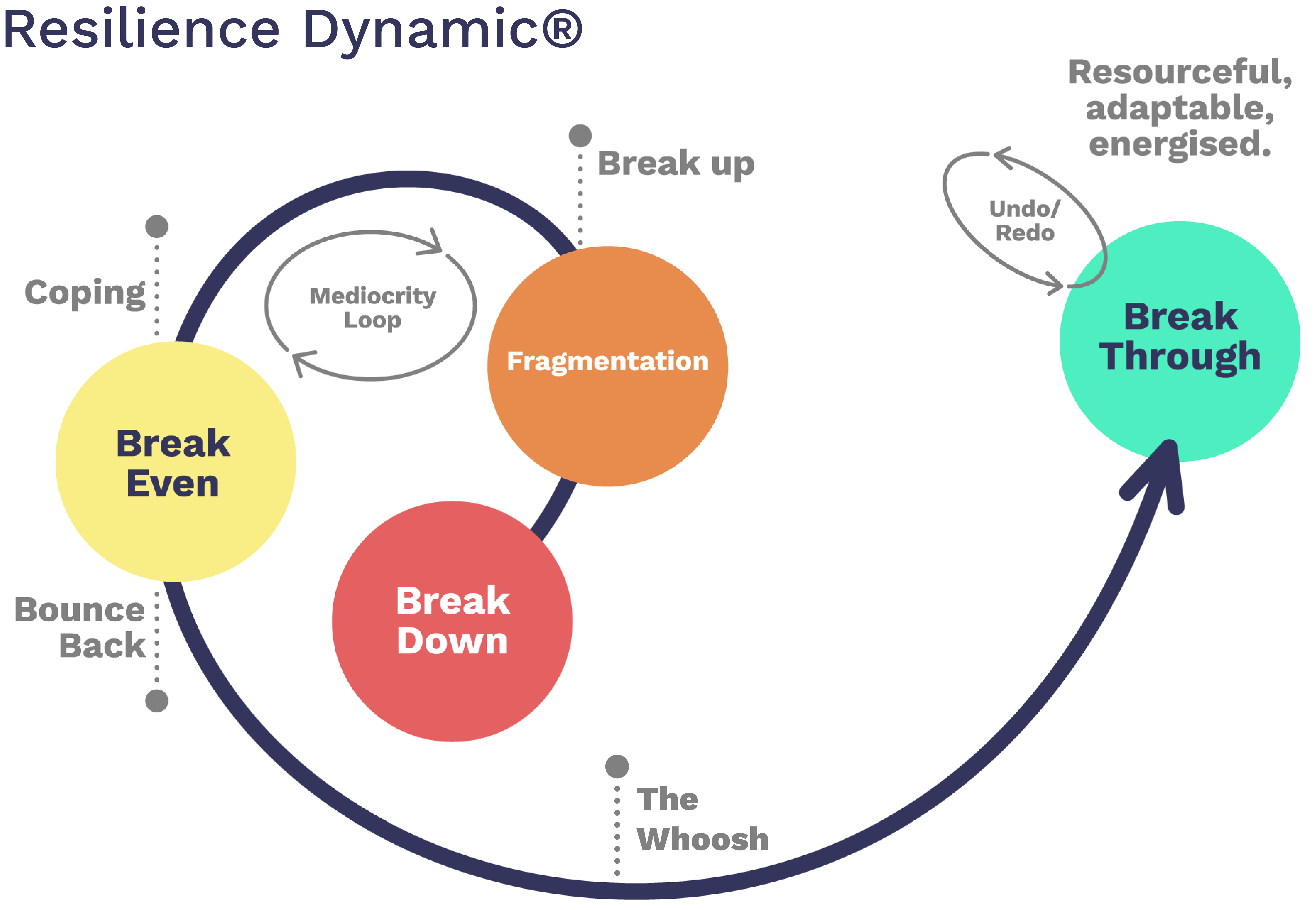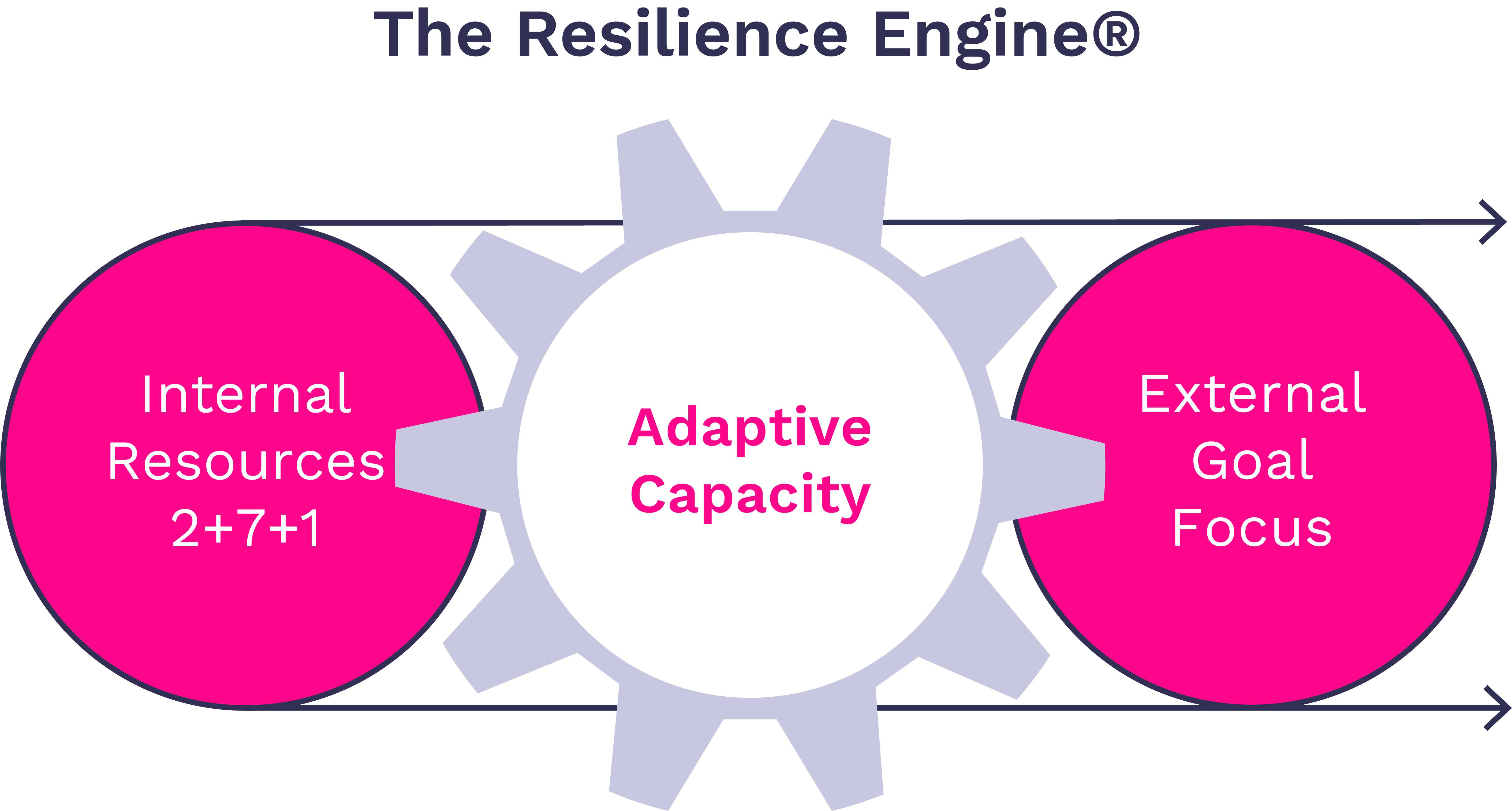What Makes Resilience Coaching Different?
The Resilience Dynamic is often asked what the difference is between ‘normal’ coaching (is there such a thing?!) and resilience coaching.
A common assumption is that resilience coaching is about tackling a deficit of resilience – a problem to be sorted, a set of challenging behaviours that need to be specifically addressed and turned around. This is not true! Well it’s not true for the Resilience Dynamic anyway, we don’t ‘sort’ resilience deficits!
The Real Work Of Resilience Coaching
What we do do, and very specifically, is account for the capacity of the client with respect to the coaching goals, and pace the work according to that. That means we help account for potential mismatches between what is desired versus the reality of what is achievable. We help the client notice their capacity, together with what drives it up and down. And we help the client figure out how they might optimise their capacity in order to be successful. This may involve shifting goals because of mismatch. Most often it includes a forward-build of resilience capacity for what might lie ahead.
Resilience Dynamic coaching is done within the workplace, so coaching goals from the organisation are business related – creating the right conditions for success, leading strategic projects, leadership development, team and relational development, career progression. Goals can be strategic or tactical. Personal goals within any contract are often around how to juggle, manage boundaries, keep well, prevent stress.
You will recognise these kinds of goals as normal coaching goals. They come up a lot in executive coaching and leadership. So resilience coaches are working on similar challenges to other executive coaches – how can someone or a team operate in the optimum way in order to service the organization’s goals?
With resilience coaching however, we specifically extend our coaching competences. We always look to the client’s resilience levels.
The work of gauging capacity versus demand is always present, even if the work is not explicitly ‘resiliency’ related.
Resilience Coaches Seek To Understand Questions Like:
- Does the client have sufficient energy to achieve what is being asked here?
- Does the client have perspective that allows them to sense-check what is coming down the line, to generate options, to overcome potential obstacles?
- Is the client optimising the resources available to them? Both internal and external resources.
- Can they realistically achieve their goals without draining their wellbeing?
- Does the client need to protect part of their capacity for the necessary must-do’s in their life? If so, how do they manage their boundaries?
- Are their goals coherent with who they are and who they want to be?
- Are the coaching goals appropriate – ethically – for this client?
This work means both parties – client and coach – both understanding and exploring the client’s resilience levels and implications, and how they might optimise resilience to service the coaching goals.
Ethically, if the demand far outweighs the client’s resilience, we help the client own that, accept it, and action a change in demand via the resources available to them. Saying ‘no’ is one of the most assertive responses to over-demand, and working through the options and implications is often part of our coaching.
There are situations where the client is blind to their own resilience drain, and they may in fact be vulnerable. Our work ensures that coaches really pay attention to this, and act according to an extended version of the Coaching Industry’s ethics, ensuring boundaries are clear between coaching and therapy or other forms of psychological support. If possible, our coaches always work to enable the client to own their situation, even in vulnerable situations. This is because taking responsibility is a core driver of resilient behaviour, and ownership, even of vulnerability, boosts the resilience of the client.
Whilst some of our work is with vulnerable clients, most work is with those whose resilience is under pressure but who are managing, albeit potentially with strain. Some of us have the privilege to work with highly resilient clients, where the work is all about alignment and consistency at a strategic level. Indeed a lot of our work is helping the client own their own capability and power, and working through the conditions of how to optimise towards that. This is exciting work!
What Is Required Of Resilience Coaches
To work in resilience, coaches need to pay attention and invest in their own resilience and wellbeing. So at the Resilience Dynamic we ask that all coaches re-accredit every 3 years. Reaccreditation requires annual CPD (we offer 6-12 hours minimum of CPD per year focused on resilience and wellbeing areas, including mental health), practical examples of resilience coaching, investment in their own resilience, and ongoing learning.
Our work is all grounded in research that the Resilience Dynamic has been carrying out since 2007. We have been steeped in the field for a long time, and our mission is to make the findings of the research accessible and practical to apply. Our research models describe what resilience is, its implications, and how to build it.
Through the 8 month Resilience Accreditation Programme, coaches learn how to apply and integrate the findings from our research:

The Resilience Dynamic® model describes the nature and spectrum of resilience levels, with client implications. It’s all about capacity for change, and where the client may or may not have sufficient capacity to meet the demands upon them. Ethics are strong in this work!

The Resilience Engine® model explains the integrative nature of resilience, how it interlocks inner beliefs and mindset, to intentions and meaning, through the Adaptive Capacity – the fuel of the engine that keeps things turning. The drivers are understood, and importantly, the coaching helps stabilise and optimise across the three components.
Why Integrate Resilience Coaching In Your Practice?
What’s lovely in resilience coaching is helping people discover and unlock their own resourcefulness. Those with the highest resilience thrive: they are energised, persistent, adaptable, well. They are, fundamentally, able to get hold of their resourcefulness, no matter what’s going on. Since the challenges faced by our clients are so multifarious, our coaching work is also!
So what makes resilience coaching different?
It adds this additional resilience lens into every part of the coaching process. It relies on coaches with a deepened set of competency, who apply the Resilience Dynamic research findings rigorously.
Our results speak for themselves. Clients operate in a healthy, high performance framework; fostering a resilience practice in their day to day.
We are proud to offer resilience coach training to those who are ready to deep dive with us! Do get in touch if you are interested: [email protected]. We’d be delighted to help.
Next Steps
- Looking for support to invest in yourself and add resilience coaching to your toolkit? Explore the Resilience Accreditation Programme.
- Watch this video exploring Change and the Resilience Gap – the work of gauging capacity versus demand.
- Discover your own resilience level for free, with our Resilience Dynamic® Indicator.

Author: Jenny Campbell Founder and CEO of the Resilience Dynamic
Follow Jenny on LinkedIn for more of her thoughts, resilience research, and ideas.
Gain exclusive access to Resilience Dynamic in-depth insights
Extend your knowledge, expand your thinking into Healthy, High Performance.
Register today and get your free login to:
- Gain exclusive access to in-depth resilience insights.
- Download and share the insights with your friends and colleagues.
- Receive resilience in-depth insights and tools straight to your inbox, every month.
If you are already receiving our resilience tools via email but it's the first time seeing this exclusive access, do register. You'll get the new exclusive insights, plus be able to download all articles. Simply complete this registration form once to get your login details.
Read our privacy policy
